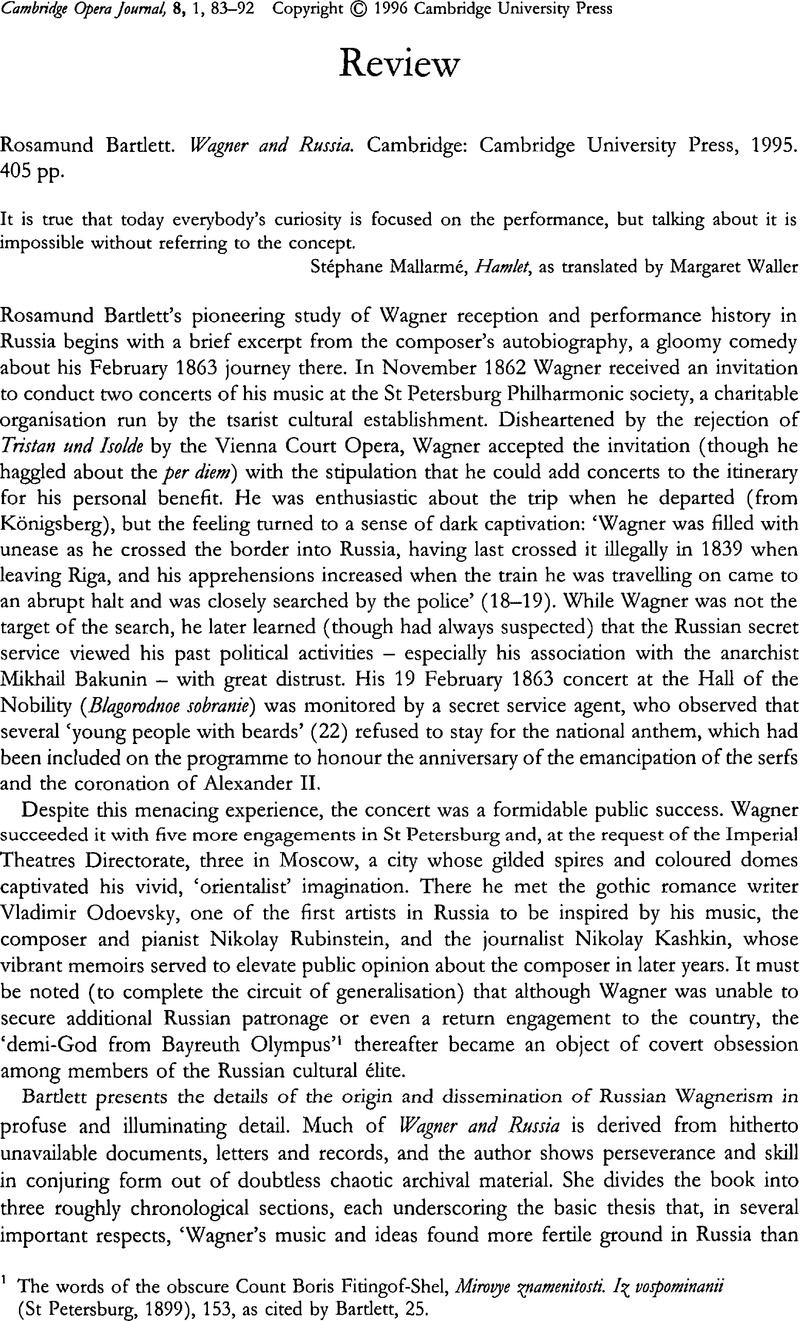No CrossRef data available.
Published online by Cambridge University Press: 27 August 2008

1 The words of the obscure Count Boris, Fitingof-Shel, Miroye Znamenitosti Iz vospominanii (St Petersburg, 1899), 153, as cited by Bartlett, 25.Google Scholar
2 Richard, Wagner, ‘The Music of the Future’, in Three Wagner Essays, trans. Robert, Jacobs (London, 1979), 35–6.Google ScholarRobert, Bailey (‘The Genesis of Tristan und Isolde’, diss. Princeton University [1969])Google Scholar and Carl, Dahlhaus (Wagners Koneption des masikalischen Dramas [Regensburg, 1971]) provide a much more refined (even contrary) interpretation of this passage, one that addresses the shift in Wagner's aesthetic views prompted by experiences with Der Ring des Nibelungen and Tristan and Isolde.Google ScholarFor a detailed overview, see Carolyn, Abbate, ‘Opera as Symphony, a Wagnerian Myth’, in Abbate, and Roger, Parker, eds, Analyzing Opera: Verdi and Wagner (Berkeley, 1989), 92–124.Google Scholar
3 For more detailed and precise information, see Richard, Taruskin, Opera and Drama in Rassia as Preached and Practised in the 1860s (Ann Arbor, 1981), 290–3.Google Scholar
4 As cited by Marina, Rakhmanova, ‘K byloi polemike vokrug “Kitezha”’, Sovetskqya Murjka, 10 (1984), 82.Google Scholar
5 See Mikhail, Bakhtin, Problems of Dostoevsky's Poetics, trans. Caryl, Emerson (Minneapolis, 1984), 6.Google Scholar
6 See Palyukh, Z. L. and Prokhova, A. V., eds, Tolstoy i muzyka (Moscow, 1977), 161. The remark is also cited by Bartlett, 53.Google Scholar
7 Evgeny, Petrovsky, ‘Skazanie o nevidimom grade Kitezhe i deve Fevronii’, Russkaya Mujkal'nqya Gazeta, 11(1907), 306.Google Scholar
8 See, for example, Friedrich, Kittler, ‘World-Breath: On Wagner's Media Technology’, in David, Levine, ed., Opera Through Other Eyes (Stanford, 1994), 215–38.Google Scholar
9 Magnus, Ljunggren provides an authoritative discussion of Medtner's political views (and aberrant psychology) in his book The Russian Mephisto: A Study in the Life and Work of Emilii Medtner (Stockholm, 1994).Google Scholar
10 Bartlett, 211, notes that this phrase was underlined in Blok's copy of Opera and Drama. For additional information, see Lukivskaya, K. P., ed., Biblioteka A. A. Bloka, I (Leningrad, 1984), 119.Google Scholar
11 These observations are made by Donald, Rayfield in ‘Celtic, Wagner and Blok’, in Arnold, McMillin, ed., Symbolism and After (London, 1992), 15–38.Google Scholar
12 Vyacheslav, Ivanov, ‘Vzglyad Skryabina na iskusstvo’, Sobranie sochinenii, III (Brussels, 1979), 174.Google Scholar
13 Edward, Braun, The Theatre of Myerhold (London, 1979), 33, cited by Bartlett, 95.Google Scholar
14 From Jun Jegalin's stenographic record of the speech, cited by James, Symons, Meyerhold's Theatre of the Grotesque (Coral Gables, 1971), 192.Google Scholar
15 Such is the ‘Wagner performative’ described by Slavoj, Zizek in ‘“The Wound Is Healed Only by the Spear That Smote You”: The Operatic Subject and its Vicissitudes’, Opera Through Other Eyes, 177–214.Google Scholar